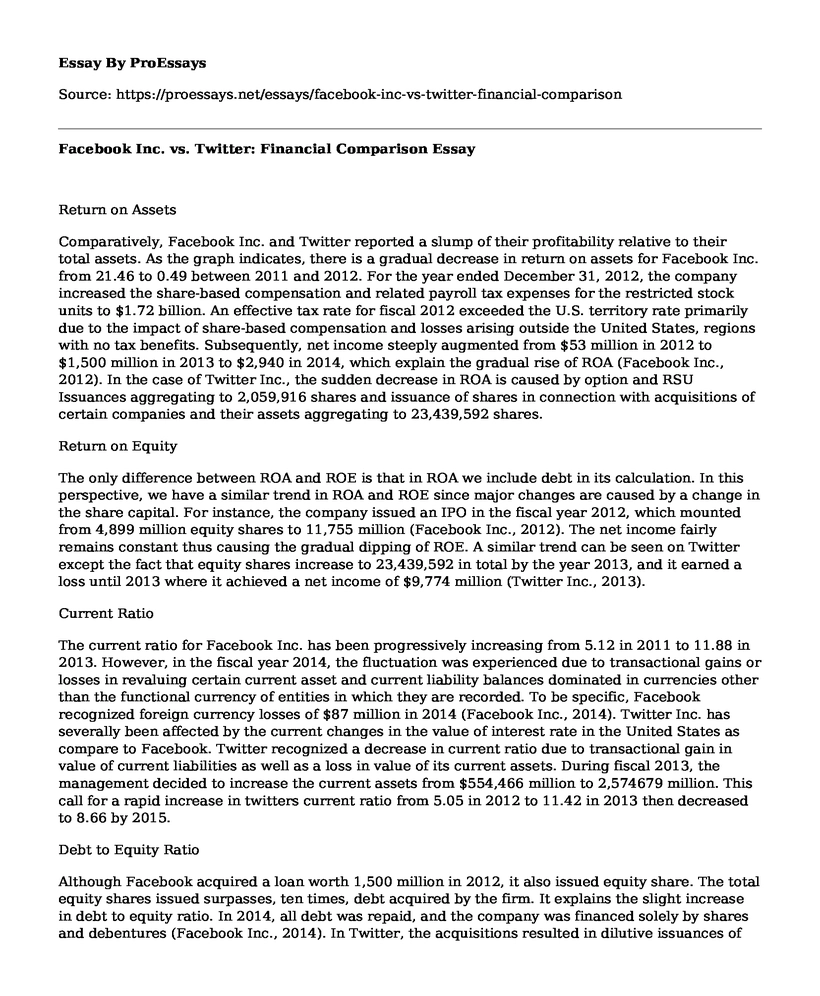Return on Assets
Comparatively, Facebook Inc. and Twitter reported a slump of their profitability relative to their total assets. As the graph indicates, there is a gradual decrease in return on assets for Facebook Inc. from 21.46 to 0.49 between 2011 and 2012. For the year ended December 31, 2012, the company increased the share-based compensation and related payroll tax expenses for the restricted stock units to $1.72 billion. An effective tax rate for fiscal 2012 exceeded the U.S. territory rate primarily due to the impact of share-based compensation and losses arising outside the United States, regions with no tax benefits. Subsequently, net income steeply augmented from $53 million in 2012 to $1,500 million in 2013 to $2,940 in 2014, which explain the gradual rise of ROA (Facebook Inc., 2012). In the case of Twitter Inc., the sudden decrease in ROA is caused by option and RSU Issuances aggregating to 2,059,916 shares and issuance of shares in connection with acquisitions of certain companies and their assets aggregating to 23,439,592 shares.
Return on Equity
The only difference between ROA and ROE is that in ROA we include debt in its calculation. In this perspective, we have a similar trend in ROA and ROE since major changes are caused by a change in the share capital. For instance, the company issued an IPO in the fiscal year 2012, which mounted from 4,899 million equity shares to 11,755 million (Facebook Inc., 2012). The net income fairly remains constant thus causing the gradual dipping of ROE. A similar trend can be seen on Twitter except the fact that equity shares increase to 23,439,592 in total by the year 2013, and it earned a loss until 2013 where it achieved a net income of $9,774 million (Twitter Inc., 2013).
Current Ratio
The current ratio for Facebook Inc. has been progressively increasing from 5.12 in 2011 to 11.88 in 2013. However, in the fiscal year 2014, the fluctuation was experienced due to transactional gains or losses in revaluing certain current asset and current liability balances dominated in currencies other than the functional currency of entities in which they are recorded. To be specific, Facebook recognized foreign currency losses of $87 million in 2014 (Facebook Inc., 2014). Twitter Inc. has severally been affected by the current changes in the value of interest rate in the United States as compare to Facebook. Twitter recognized a decrease in current ratio due to transactional gain in value of current liabilities as well as a loss in value of its current assets. During fiscal 2013, the management decided to increase the current assets from $554,466 million to 2,574679 million. This call for a rapid increase in twitters current ratio from 5.05 in 2012 to 11.42 in 2013 then decreased to 8.66 by 2015.
Debt to Equity Ratio
Although Facebook acquired a loan worth 1,500 million in 2012, it also issued equity share. The total equity shares issued surpasses, ten times, debt acquired by the firm. It explains the slight increase in debt to equity ratio. In 2014, all debt was repaid, and the company was financed solely by shares and debentures (Facebook Inc., 2014). In Twitter, the acquisitions resulted in dilutive issuances of equity securities, cognitive liabilities and the incurrence of debt during fiscal 2013 (Pepitone, 2013). Thus, the value of equity shares supersedes that of debt and therefore debt to equity ratio declines to 0.75. The company acquired more debt which outweighs equity share.
References
Facebook Inc.,. (2012). Annual Report 2012. Investors. Retrieved 22 April 2016, from http://files.shareholder.com/downloads/AMDA-NJ5DZ/1934736441x0x658233/46826077-D2FD-4E84-9BBE-C3F844B547A0/FB_2012_10K.pdf
Facebook Inc,. (2014). Annual Report 2014. Investors. Retrieved 22 April 2016, from http://files.shareholder.com/downloads/AMDA-NJ5DZ/1934757999x0x852173/F61276C5-0AE9-49DE-BFD9-087398F85EC8/FB2014AR.pdf
Pepitone, J. (2013). Twitter not yet profitable. CNNMoney. Retrieved 22 April 2016, from http://money.cnn.com/2013/10/03/technology/social/twitter-ipo/
Twitter Inc,. (2013). Annual Report. Investors. Retrieved 22 April 2016, from http://files.shareholder.com/downloads/AMDA-2F526X/1934774072x0x742484/A418947A-E065-4822-8BD4-00FA8EB4E795/Twitter_2013_Annual_Report_-_FINAL.pdf
Cite this page
Facebook Inc. vs. Twitter: Financial Comparison. (2021, Mar 13). Retrieved from https://proessays.net/essays/facebook-inc-vs-twitter-financial-comparison
If you are the original author of this essay and no longer wish to have it published on the ProEssays website, please click below to request its removal:
- Taxation Theory, Practice and Laws
- Muslim Representation in Cinemas Essay
- Doris Pilkington's Rabbit-Proof Fence Essay
- A Review of the Film Take the Lead Paper Example
- Financial Analysis of Apple Company Paper Example
- Essay Sample on Cryptocurrency: Digital Asset Revolutionizing Financial Transactions
- Disney's Fairytales: Breaking the Spell of Gender Stereotypes - Essay Sample







